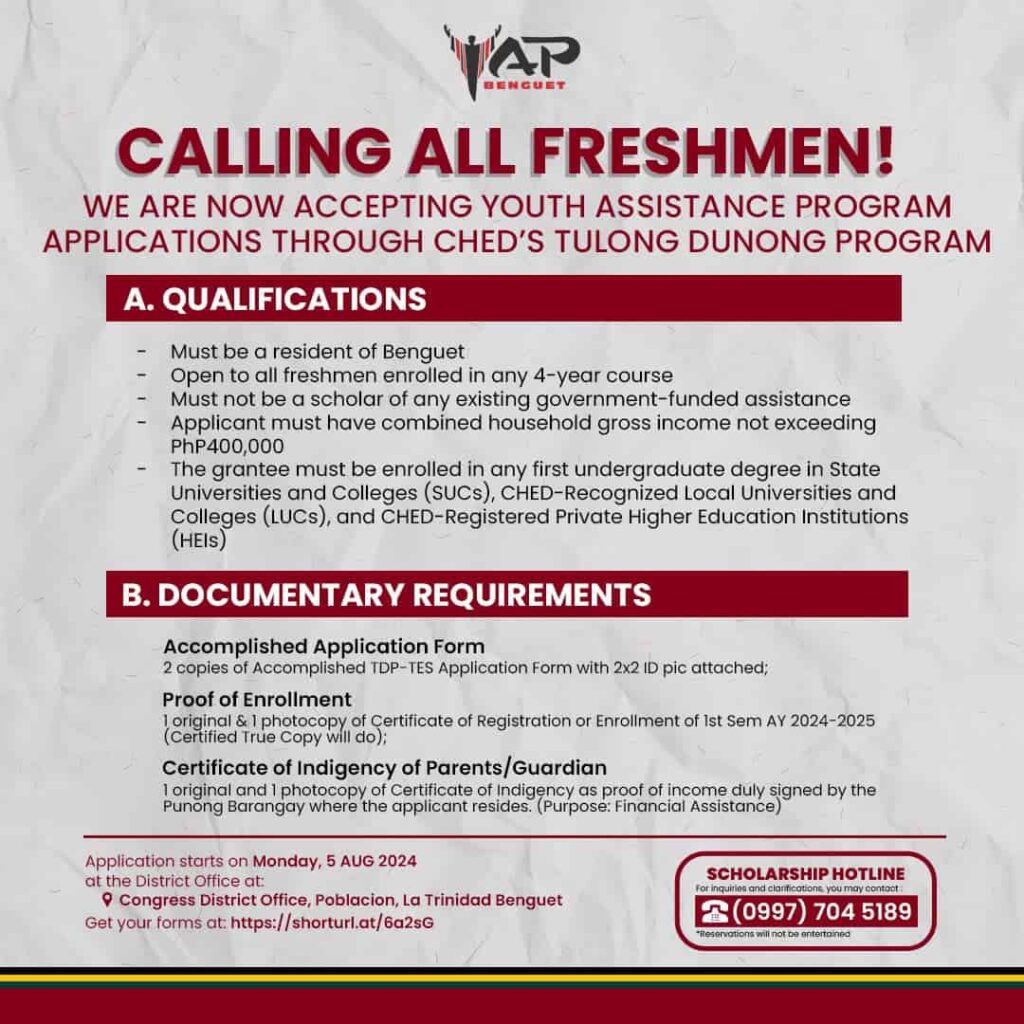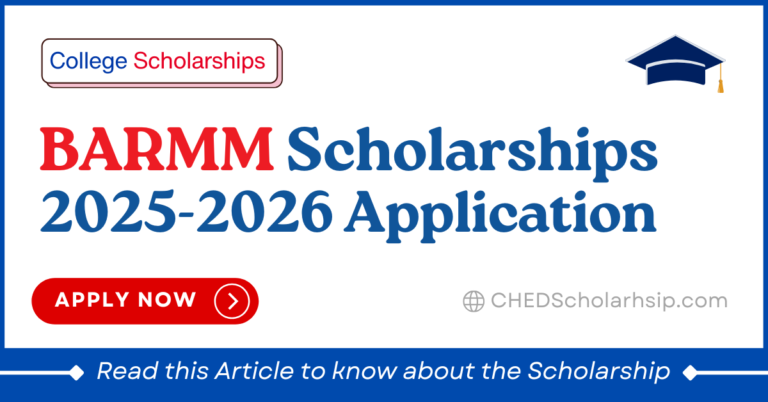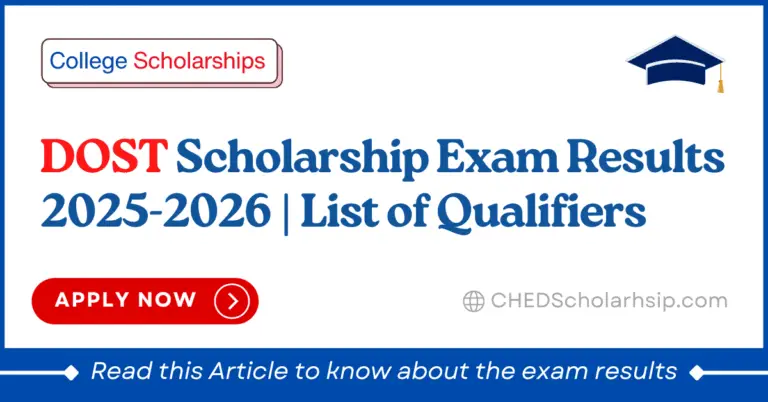⚡Click here for Ongoing College Scholarships 2025-2026
CHED Tulong Dunong Scholarship 2024-2025 | Apply NOW
The CHED Tulong Dunong Scholarship 2024-2025 is a program provided by the Philippines Commission on Higher Education (CHED). Its goal is to provide financial assistance to qualified and deserving students pursuing a college degree.

To help students maintain and pursue their college or tertiary education, CHED offers different scholarship programs for eligible and qualified students. The CHED Tulong Dunong Program (TDP) is one of these scholarships.
Table of Contents
- CHED Tulong Dunong Scholarship 2024
- CHED TDP Scholarship Benefits
- Number of Slots Open for Scholarship
- Qualifications for Scholarship
- Documentary Requirements
- CHED TDP Application Timeline
- Important Points to Note
- How to Apply for CHED Tulong Dunong Scholarship
- FAQs
CHED Tulong Dunong Scholarship 2024
The Tulong Dunong Program (TDP), often known as CHED-TDP, is one of CHED’s many scholarship programs. This program aims to help eligible and qualified Filipino students pursue their education in the Philippines.
Congressman Eric Yap has recently announced the opening of the CHED Tulong Dunong Scholarship program for the academic year 2024-2025 via a Facebook post. The Congressman is calling in applications from all interested and eligible freshmen college students enrolled in any undergraduate program for the SY 2024-2025.
This scholarship program is extremely beneficial to Filipino students, especially those who cannot afford to go to college. That’s a great opportunity for Filipino students to complete their college degrees for free or to lessen their financial difficulty.
CHED TDP Scholarship Benefits
Each and Every CHED Scholar who is qualified for the CHED TDP Scholarship program will receive a scholarship grant of Php 7,500.00 per semester.
READ: Ongoing College Scholarships 2025-2026 | Apply Now
Number of Slots Open for Scholarship
The CHED TDP Scholarship program has more than 1000 slots open for Scholarships and in addition to these, all barangays were also given 4 slots each.
Qualifications for Scholarship
The list of qualifications required to apply for CHED TDP Scholarship are as follows:
- Applicant must be a resident of Benguet
- This scholarship is open to all freshmen enrolled in any 4-year course
- He or She must not be a scholar of any existing government-funded assistance
- The Applicant must have combined household gross income not exceeding PhP400,000
- The grantee must be enrolled in any first undergraduate degree in State Universities and Colleges (SUCs), CHED-Recognized Local Universities and Colleges (LUCs), and CHED-Registered Private Higher Education Institutions (HEIS).
READ: OWWA Scholarship 2024-2025 is open – Apply NOW
Documentary Requirements
The list of documents required to apply for CHED TDP Scholarship is as follows:
- Accomplished Application Form (link given below) – 2 copies of Accomplished TDP-TES Application Form with 2×2 ID pic attached;
- Proof of Enrollment – 1 original & 1 photocopy of Certificate of Registration or Enrollment of 1st Sem AY 2024-2025 (Certified True Copy will do);
- Certificate of Indigency of Parents/Guardian – 1 original and 1 photocopy of Certificate of Indigency as proof of income duly signed by the Punong Barangay where the applicant resides. (Purpose: Financial Assistance).
CHED TDP Application Timeline
- The Opening date of CHED TDP Scholarship program is August 5, 2024.
- The deadline date for the scholarship program is not announced yet.
Important Points to Note
Following are some important points applicants must know while applying for this scholarship program:
- Please go to the District office starting August 5, 2024, to submit your application.
- The processing of applications will be on First come first serve basis. So, submit your application as soon as possible.
- All applications will be validated and assessed by CHED. If successful, scholar ka na hanggang sa makatapos ka na 4-year course! No need to re-apply every year.
- Kahit anong pinagmulan mo, kahit saan ka pinanganak, kahit anong background mo, basta taga Benguet ka na, qualified ka! Tara, apply na!
How to Apply for CHED Tulong Dunong Scholarship
All interested and eligible applicants can apply for the CHED Tulong Dunong Scholarship program for the School year 2024-2025 by securing the Application form online and submitting the application form with requirements at the District Office.
- District Office Address: Congress District Office, Poblacion, La Trinidad Benguet.
- Secure your Application form from here: https://shorturl.at/6a2sG.
For inquiries and clarifications, please contact YAP-TDP hotline 0997 704 5189. No reservations will be accepted.

FAQs
CHED Tulong Dunong scholarship is a financial assistance program initiated by the Commission on Higher Education (CHED). It aims to help financially challenged students in pursuing higher education by providing financial assistance for tuition, school fees, and a monthly allowance.
Interested applicants may apply each academic year by submitting the necessary documents and going through the selection process. The application process and requirements change, so check with the CHED website for the most up-to-date information.
The CHED-TDP scholarship is for qualified and eligible Filipino students. They may be High School graduates or College students with earned units in CHED recognized degree/programs of Private Higher Education Institutions (Private HEIs), SUCs or LUCs with COPC, or a passer of the Alternative Learning System (ALS), or a passer of the Philippine Educational Placement Test (PEPT).
The Tulong Dunong Program is a financial assistance program for CHED priority courses students.
Application deadlines vary by region and school. It is important to check with the CHED Regional Office or your school’s website for the deadline.
Grantees or student grantees are eligible for a grant of Seven thousand five hundred pesos (Php 7,500) per semester to help with the expenses of their tertiary education. This includes school expenses or tuition fees as well as a living allowance.
Note: Our articles are solely for informational purposes. We are not affiliated to the entities featured. The source/s are provided at the bottom of each article so that you can double-check the authenticity of the articles.
[Source: Congressman Eric Yap]



